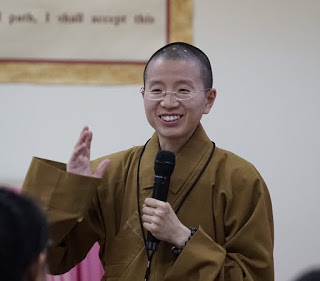
Speaker: Ven. Zhi Xing
Fo Guang Shan Hsi Lai Temple, Los Angeles
I. Introduction
Auspicious Greetings to all friends from around the world! My name is Ven. Zhixing. Thank you for joining our online English Dharma service. In this series, I will be sharing some of the teachings from the Eight Realizations of a Bodhisattva Sutra.
In this sutra, the Buddha taught us eight realizations that we should learn and practice so that we can be free from all the afflictions in life and always be happy and at ease. I will be focusing on one point of each realization as I share. If you are interested in learning more about the eight realizations, you can read the commentary on the Eight Realizations of a Bodhisattva Sutra written by Venerable Master Hsing Yun.

II. First Realization
Realize that this world is impermanent and that nations are dangerous and fragile. The four great elements lead to suffering and are empty and the five aggregates are without a self. All things arise, cease, change, and become different; they are illusory, not real, and cannot be controlled. The mind is the source of unwholesomeness and the body is a gathering of wrongdoings. Contemplate this and you will gradually run away from the cycle of birth and death.
III. The Realization of Impermanence
A very important insight we should gain from this realization is that all phenomena are impermanent, meaning everything from our emotions and thoughts to everything in the universe are subjected to changes. Things arise and things disappear. Just like tree grows from a small seed, or the advancement of technology – the first generation iPhone came out, then it was replaced by newer generation of iPhone or feeling happy one moment, then feeling sad the next moment when we suddenly receive a bad news or just simply the fact that we are growing older everyday. Even things that seem permanent are changing all the time.
Just like the mountain. If we look at it today and look at it a few decades later, the mountain might seem the same. However, if we look at it closely, it is not the same anymore. It might be eroded by rain, all the insects, animals and plants are not the same. There might be landslide due to flooding or other changes due to earthquake or mountain fire. If we zoom in to look at things at a molecular levels, all the atoms are vibrating all the time, forming and breaking bonds with other atoms.
Everything changes every single moment. As Heraclitus, the Greek philosopher said, “There is nothing permanent except change.” However, we don’t like change. We take comfort in permanency. We hope and believe that we will be young and healthy all the time. Our loved one will be with us forever. Life will go on as usual. Everything will go according to plan. Because we tend to believe that things will be the same at the back of our mind, we easily form attachment to people or things. When we go for an interview, we said that we want to get a permanent job.
i. When Things Change
What would happen when things do change? Most of time, we refuse to accept changes as it might take us out of our comfort zone or it might not be what we like. Just like this pandemic, which change our life forever. For a lot of people, it’s hard for them because they resist the fact that they are not able to go out when they want to, resist the fact that they have to wear a face mask, and resist the fact that all the plans get messed up, not to mention some people might be facing sickness and the death of a loved one. Because of these resistances to changes, lots of people become negative, sad, anxious, depress, angry and filled will physical and or mental suffering. However, we don’t have to feel negative. All the negativity starts the moment we don’t accept the change.
Changes occurs often in our life. It all depends on how we face it. Impermanence can mean break through our limit and strive to be better.
ii. The Success Story of KFC
If we look at the founder of KFC, Mr. Colonel Sanders, we would think that he was a very successful businessman, founding a world famous fast-food restaurant company. However, who would have thought that he had faced multiples misfortunes, failures and rejections.
Colonel Sanders ‘s father passed away when he was six, leaving him to take care of his siblings. In seventh grade, he dropped out of school and left home to go work as a farmhand.
He faked his age to enlist in the United States army at age 16. After being discharged a year later, he had had numerous jobs, including farmer, streetcar conductor, railroad fireman, insurance salesman and founding a ferry company.
It wasn’t until age 40 that he began selling chicken dishes in a service station. As he began to advertise his food, an argument with a competitor resulted in a deadly shootout. Four years later, he bought a motel which burned to the ground along with his restaurant. Yet he didn’t give up. He rebuilt and ran a new motel until World War II forced him to close it down.
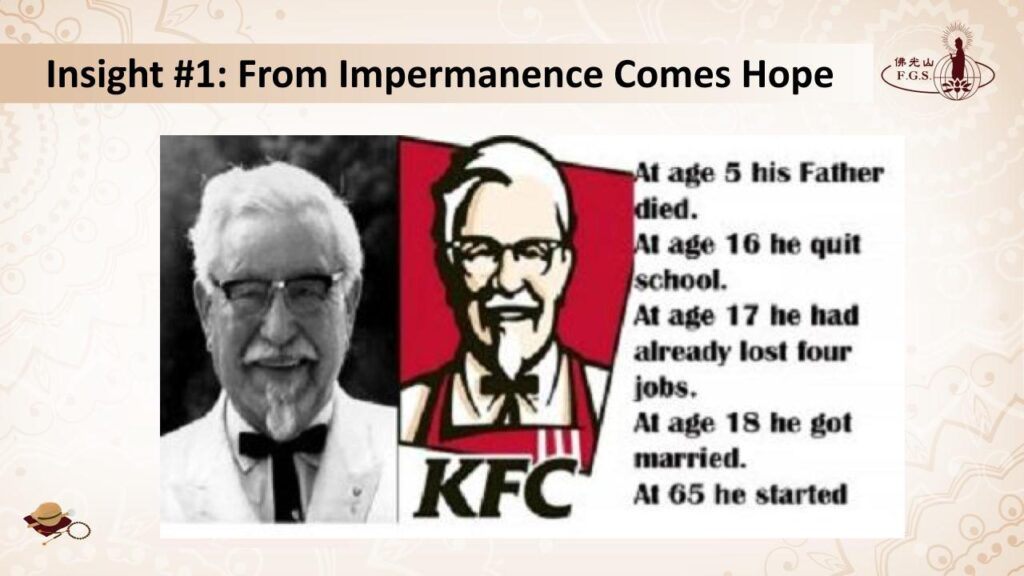
Following the war, he tried to franchise his restaurant. His recipe was rejected 1,009 times before anyone accepted it. Sander’s “secret recipe” was coined “Kentucky Fried Chicken”, and quickly became a hit. However, the booming restaurant was crippled when an interstate opened nearby, so Sanders sold it. He then started traveling across the country, cooking batches of chicken from restaurant to restaurant, striking deals
After years of failures and misfortunes, Sanders finally did it. KFC expanded internationally and he sold the company for two million dollars, which is $15.3 million today.
What would you do if you are Colonel Sanders facing all these changes? What would happen if we don’t accept the changes and misfortunes that we encounter? We might dwell in anger, sadness, depression, and frustration. To escape from facing problems and all the negative thoughts, some people might choose to drink or to gamble. Slowly, this would lead to family breaking apart. There are some people who might start to blame others and complain about the unfairness for the rest of their life. However, there are some people like Colonel Sanders who accepted the changes and failures and stood up again. It’s through all these hardships and difficulties that helped him continue to breakthrough and come up with his special recipe for the fried chickens, which of course ultimately led to his success. If Sanders didn’t stand up again after facing these changes in his career, there won’t be KFC today.
iii. Face Changes with the Right Attitude
In our life, we will face changes in our relationship, changes in our career, changes in our health, and changes in various parts of our life. This is the reality that the first insight in the sutra told us. The more important question to ask is how should we work with changes so that we will have happiness in life? It is actually all from this mind. It all depends on facing changes with the right attitude.
When facing changes, we should embrace it and view that it’s the normal reality in life. It will happen. Things may seem bad or unfavorable to us. However, things are uncertain. What seems bad at the moment doesn’t mean that it will always be. It might turn out to be an opportunity. Impermanence give us lots of hope.
A commonly used antibiotic, penicillin, was actually discovered by a failed experiment, a change in the experiment from the original intent. Sir Alexander Fleming, was searching for a “wonder drug” that could cure diseases. However, he didn’t find what he was looking for in his experiment, so he ended it. After returning from holiday, he was sorting through the petri dishes containing the bacteria of Staphylococcus. He noticed that one of them contained a mold that seemed to secreted something that inhibit bacterial growth around it. He grew the mold by itself and discovered the powerful antibiotic, penicillin. What is bad and what is good? Changes may not be good, but they may not be bad either. It seems bad that the experiment didn’t work out. However, the result turns out to be good because it led Alexander Fleming in discovering penicillin.
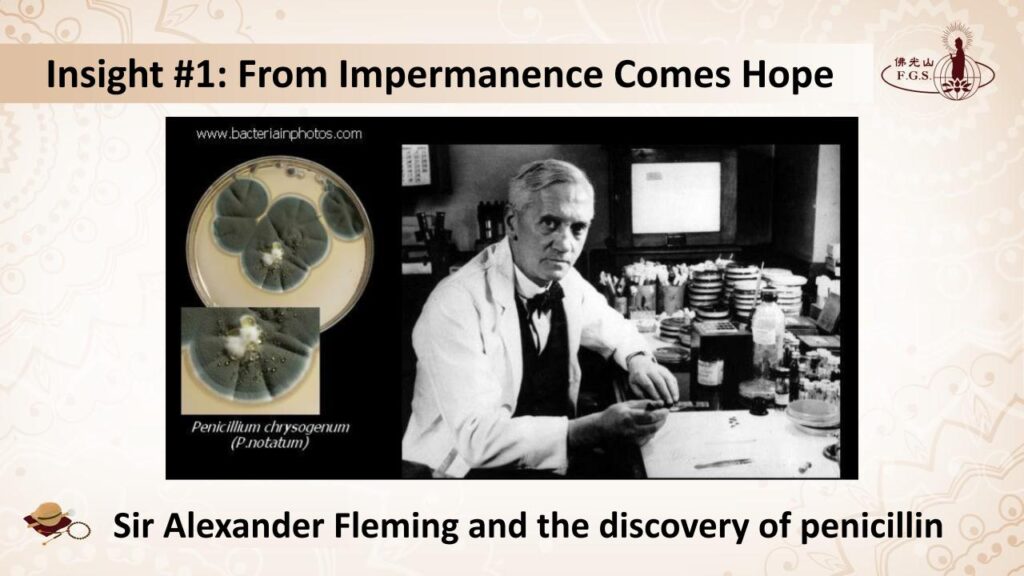
This is the same with the potato chips that we often snack on. Potato chip was an accidental invention by an African American chef, George Crum. He was serving fried potatoes to a very fussy customer, and the customer was displeased with the thickly-cut potatoes and demanded Crum to cut them even thinner. So, Crum made the chips that were too thin to eat with a fork, hoping to annoy the extremely fussy customer, surprisingly enough, the customer was happy – and potato chips were invented! It seems bad that George Crum needed to deal with a bad customer, who probably annoyed him a lot. However, it’s also because of this customer that led him to create potato chips. Thus, changes may not be bad. A new way of cooking fried potatoes creates a popular snack.
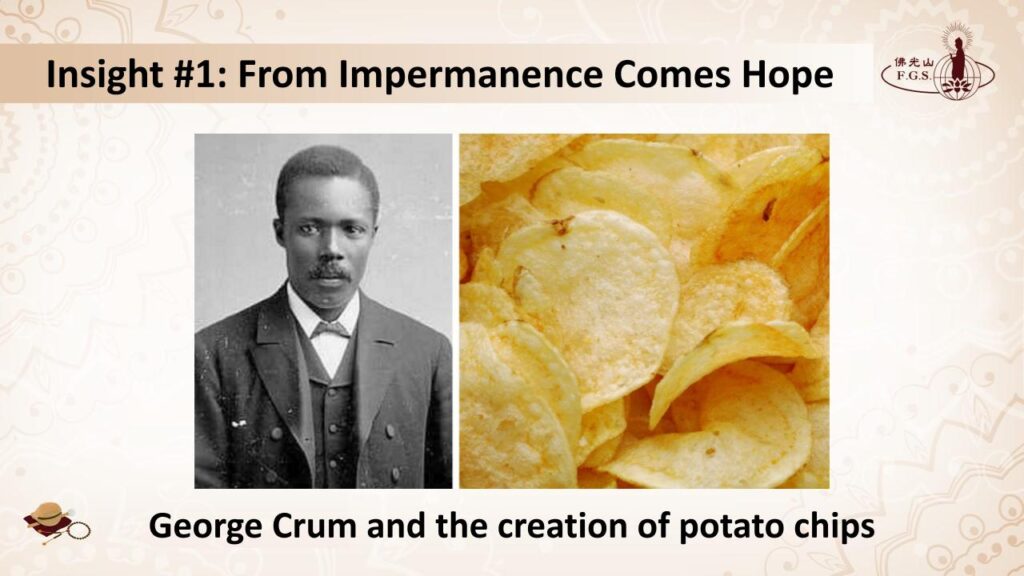
IV. Learn to Let Go
The second attitude that we should have in facing impermanence is to learn to let go.
When facing our problems or adversities in life, we might feel like we are drowning in negative emotions. We have to remember that even our feelings and emotions are changing all the time. It is not who we are. Feelings arise in response to the conditions that we encounter. Just like there is a lady walking down the street in a very good mood. Suddenly, a man bumped into her and accidentally spilled some coffee on her new dress. The lady became very angry and started to yell at the man. The lady was feeling happy before the man bumped into her. Where is her happy feeling after the man spilled coffee on her? Where was her anger before she met the man? Feelings change all the time. They don’t define who we are and they are definitely not us. You might be feeling bad and negative right now. Tell yourself that these feelings will come to pass. Feelings are changing all the time. Therefore, there is no point in holding onto them. Just let them go.
V. Be Grateful and Appreciative
Third attitude that we should have in facing impermanence is to be grateful and appreciate what we have. As impermanence is the constant reality in our life, we should be grateful and appreciate all that we have.
There is a COVID-19 survivor who shared his story. He said that the COVID-19 hit him so hard that he was hospitalized. Not long after, he was being put on the air ventilator to help him in breathing. He stayed in the hospital for several months, and ended up with a huge bill. As he left the hospital, he felt so grateful that he survived and that he can breathe for free!
Often time, we take a lot of things or people for granted. It’s just like we never think that breathing air is anything special. It isn’t until someone who had troubled with breathing would he/she realize that even being able to breath is a luxury. There was a research study conducted that interviewed people who lived in hospice about what they regret the most. Most of them said that they regret not spending more time with their family. When we are young, we are always busy with many things like our relationship, our career, and chasing after our desires. We feel that our family will always be there, thus we may often neglect them. We take it for granted that they will always be around us. However, changes do occur. We may want to travel with our parents and suddenly realize that our parents were too old and weak to travel. Therefore, be grateful and appreciative to everyone around us and everything we have.
VI. Conclusion
To conclude, there is no good or bad to impermanence. It is just the reality in life. However, we can learn to face it with a positive attitude so that we can be happy. Changes mean there is always hope. It means improvement and advancement. It teaches us to let go, and to be grateful and appreciative to everyone around us and everything we have. Remember, whether changes is good or bad depends on how we think about it.
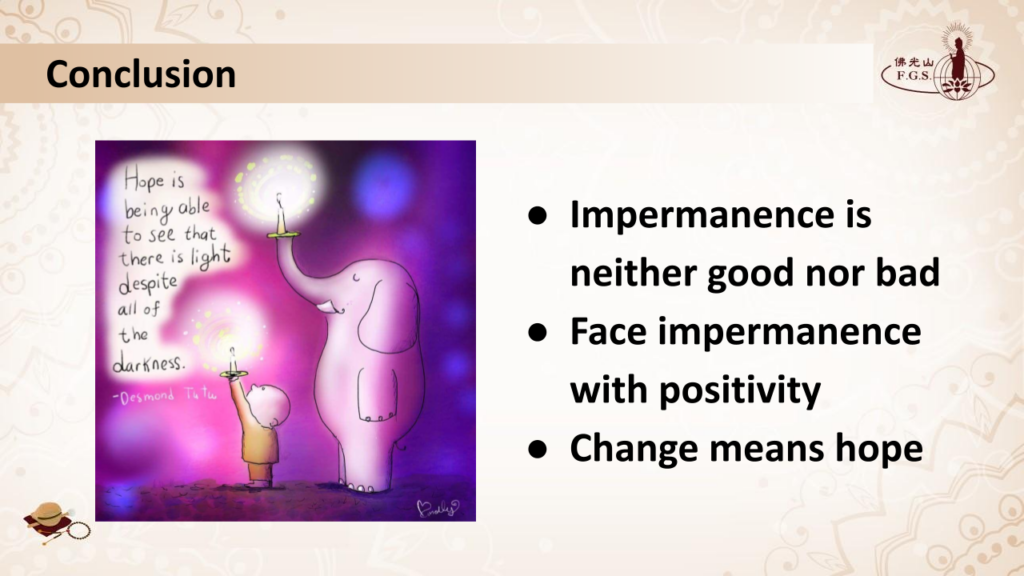
Last, but not least, thank you for joining us in the Dharma Service. May Buddhas and Bodhisattvas bless everyone with happiness and peace. Omitofo.

